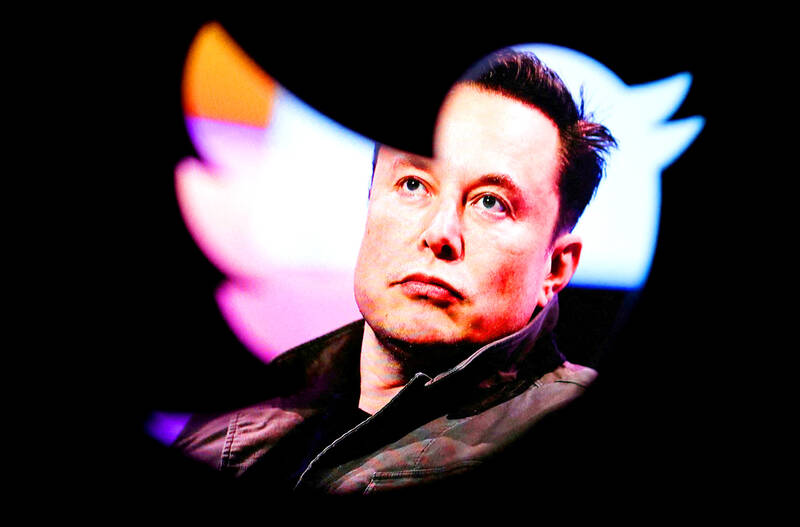Twitter Inc CEO Elon Musk on Saturday announced a plan for the social media platform to allow media publishers to charge users on a per-article basis with a single click.
“This enables users who would not sign up for a monthly subscription to pay a higher per-article price for when they want to read an occasional article,” Musk wrote on Twitter, adding: “Should be a major win-win for both media orgs & the public.”
He said the plan would begin next month, but provided no details on exact pricing or what cut Twitter would take.

Photo: Reuters
The announcement came as Musk has been struggling to make Twitter profitable amid frequent controversy.
Media organizations have wrestled for years with how to formulate subscription plans that pay their operating costs, even as readers have grown accustomed to getting news for free on the Internet.
The Musk plan raises questions about how he would make the micro-payment approach work when others have failed. British journalist James Ball listed several problems with micro-payment — an idea, he said in a Columbia Journalism Review article “definitely occurred to major publishers across the planet.”
Many readers will simply click away when encountering a paywall, Ball said.
Publishers “vastly” prefer to sign up full-time subscribers, which bring far more in ad revenue than the 20 cents or so from the sale of a single article, he said.
The per-article approach could encourage “click bait” or favor large publishers, some people on Twitter said.
However, other Twitter users reacted positively.
“Great idea,” wrote Greg Autry.
“As a frequent author in publications like Forbes, Foreign Policy, and Ad Astra, I’m often frustrated when my work ends up behind a paywall that my followers aren’t willing to subscribe to. This is the right solution,” he wrote.
Carlos Gil, author of a book on marketing, wrote: “Finally, a pay-per-view for news that won’t make you feel like you’re buying an overpriced stadium beer. Get your articles a la carte and keep your wallet happy.”

Semiconductor shares in China surged yesterday after Reuters reported the US had ordered chipmaking giant Taiwan Semiconductor Manufacturing Co (TSMC, 台積電) to halt shipments of advanced chips to Chinese customers, which investors believe could accelerate Beijing’s self-reliance efforts. TSMC yesterday started to suspend shipments of certain sophisticated chips to some Chinese clients after receiving a letter from the US Department of Commerce imposing export restrictions on those products, Reuters reported on Sunday, citing an unnamed source. The US imposed export restrictions on TSMC’s 7-nanometer or more advanced designs, Reuters reported. Investors figured that would encourage authorities to support China’s industry and bought shares

FLEXIBLE: Taiwan can develop its own ground station equipment, and has highly competitive manufacturers and suppliers with diversified production, the MOEA said The Ministry of Economic Affairs (MOEA) yesterday disputed reports that suppliers to US-based Space Exploration Technologies Corp (SpaceX) had been asked to move production out of Taiwan. Reuters had reported on Tuesday last week that Elon Musk-owned SpaceX had asked their manufacturers to produce outside of Taiwan given geopolitical risks and that at least one Taiwanese supplier had been pushed to relocate production to Vietnam. SpaceX’s requests place a renewed focus on the contentious relationship Musk has had with Taiwan, especially after he said last year that Taiwan is an “integral part” of China, sparking sharp criticism from Taiwanese authorities. The ministry said

US President Joe Biden’s administration is racing to complete CHIPS and Science Act agreements with companies such as Intel Corp and Samsung Electronics Co, aiming to shore up one of its signature initiatives before US president-elect Donald Trump enters the White House. The US Department of Commerce has allocated more than 90 percent of the US$39 billion in grants under the act, a landmark law enacted in 2022 designed to rebuild the domestic chip industry. However, the agency has only announced one binding agreement so far. The next two months would prove critical for more than 20 companies still in the process

CHANGING JAPAN: Nvidia-powered AI services over cellular networks ‘will result in an artificial intelligence grid that runs across Japan,’ Nvidia’s Jensen Huang said Softbank Group Corp would be the first to build a supercomputer with chips using Nvidia Corp’s new Blackwell design, a demonstration of the Japanese company’s ambitions to catch up on artificial intelligence (AI). The group’s telecom unit, Softbank Corp, plans to build Japan’s most powerful AI supercomputer to support local services, it said. That computer would be based on Nvidia’s DGX B200 product, which combines computer processors with so-called AI accelerator chips. A follow-up effort will feature Grace Blackwell, a more advanced version, the company said. The announcement indicates that Softbank Group, which until early 2019 owned 4.9 percent of Nvidia, has secured a